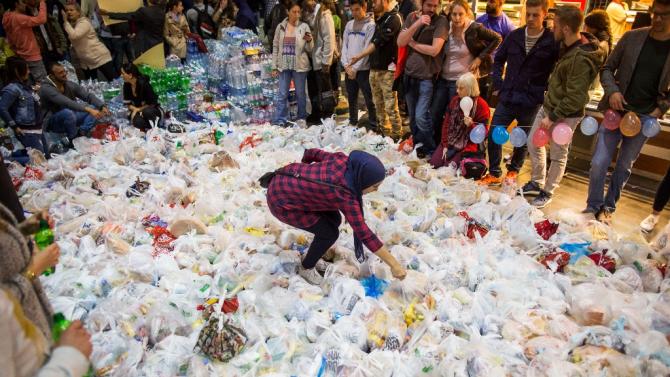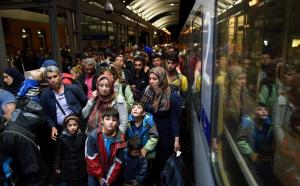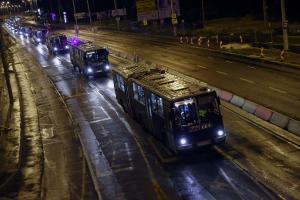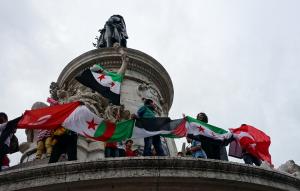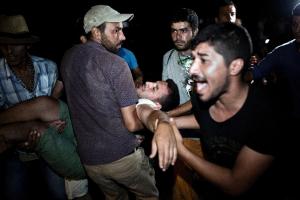Date: Sun, 6 Sep 2015 13:01:29 +0200
By Peter Murphy with Bryan McManus in Luxembourg
Vienna (AFP) - Thousands of migrants streamed into Austria, desperate to travel on to Germany after days of ugly standoffs with authorities in Budapest's train station that made headlines worldwide.
Austria's interior ministry said 6,500 people had crossed into the country since Friday night, when Hungary laid on more than 120 buses to ferry the migrants to the border.
Exhausted but happy, migrants climbed off buses then walked the final metres across the frontier to the town of Nickelsdorf where the Austrian authorities had set up a makeshift shelter.
"My toes hurt, a lot of blood, we walked too much. I want to go (to) Germany, but then I stop," one 26-year-old Syrian man from Homs, who had both his feet wrapped in thick bandages, told AFP.
Andreas Zenker, a spokesman for the Red Cross whose medics were treating the new arrivals on the border, said many migrants had serious injuries.
"We treated a two-day-old gunshot wound. We're seeing eye injuries caused by stun grenades. We're seeing bruising, including children with bruising," he told Austria's APA news agency.
Hungary has become a key point of entry for the hundreds of thousands of migrants and refugees fleeing war and poverty in the Middle East and Africa and hoping to make a better life in the European Union.
The government laid on buses to transport thousands of migrants to Austria after chaotic scenes outside Budapest's main train station, where they have been living in makeshift camps.
But on Saturday, Hungary's police chief announced the end of the bus transfer, calling it a "one-off", and columns of refugees set out on foot for the Austrian border, some 175 kilometres (110 miles) away.
"This has to be an eye opener, how messed-up the situation in Europe is now," Austrian Foreign Minister Sebastian Kurz said on arriving in Luxembourg for European Union talks dominated by the crisis.
"I hope that this serves as a wake-up call that (the situation) cannot continue."
- 'Sliver of humanity' -
At the border, most migrants boarded special buses and trains to Vienna, from where they planned to continue on to Munich, or other German cities, on the last leg of their perilous journey.
Germany's open policy on asylum has made it a magnet, especially for those fleeing war-ravaged Syria, and is expected to cost Berlin around 10 billion euros ($11 billion) this year, according to the Frankfurter Allgemeine newspaper.
But Chancellor Angela Merkel insisted Germany could still balance its budget and fulfil its "duty" as a haven.
In Vienna, the new arrivals were greeted by a small army of volunteers handing out food, drinks, sanitary products and train tickets.
"After endless examples of shameful treatment by governments of refugees and migrants in Europe, it is a relief to finally see a sliver of humanity," said Amnesty International's Gauri van Gulik.
Europe is deeply divided over how to handle the continent's biggest refugee crisis since the end of World War II, and Hungary's hard line contrasted with a show of solidarity elsewhere in Europe.
Finnish Prime Minister Juha Sipila offered to put up refugee families in his country home, in France more than 10,000 people rallied in support of the migrants and in Frankfurt, hundreds of Germans gathered at the city's railway station to welcome refugees with water, food and clothing.
Under intensifying pressure at home and abroad, British Prime Minister David Cameron is set to admit 15,000 refugees from Syria, the Sunday Times reported in London.
EU foreign ministers, meeting in Luxembourg, discussed proposals for mandatory quotas to resettle 160,000 refugees across member states.
But the 28-nation bloc is divided roughly along east-west lines, with relative newcomers to the EU from the former Soviet bloc, led by Hungary, taking a harder stance.
- 'Coordinated approach' -
In France, French Interior Minister Bernard Cazeneuve will chair a meeting on September 12 that will bring together dozens of city and town mayors who have volunteered to take in refugees, the weekly Journal du Dimanche said.
"This mobilisation... requires organisation, rigour and support from the state, as well as its knowledge, finance and prevailing resources," Cazeneuve was quoted as saying in a letter to the mayors.
The horrific human cost of the crisis was brought home when the lifeless body of a three-year-old Syrian boy, Aylan Kurdi, washed up on a beach in Turkey.
Aylan, his brother and mother died after the boat in which they were crossing the Aegean Sea to Greece capsized.
On Saturday a two-month-old baby died shortly after arriving on the Greek island of Agathonisis, having sailed with its family from Turkey. Authorities did not immediately provide the cause of death.
And on the Greek island of Lesbos, riot police used tear gas Saturday night to drive back thousands of migrants who had tried to force through barriers to board a ship chartered to transfer some of them to Athens, police said.
Also Saturday over 100 Syrian refugees were safely rescued from the Mediterranean after their boat ran into trouble off the southern coast of Cyprus, authorities said.
The 114 Syrians, including 54 women and children, had been fleeing Syria in a small fishing boat when it ran into trouble late on Saturday some 40 nautical miles from the Cypriot port of Larnaca, a source in the island's Joint Rescue Coordination Centre said Sunday.
The UN refugee agency UNHCR on Saturday said 366,402 migrants had crossed the Mediterranean to Europe this year, with 2,800 dying or going missing en route.
International Monetary Fund (IMF) chief Christine Lagarde said her agency would help as much as it could, but said the effort had to be collective.
"I think it is everybody's concern and everybody's business and it cannot be left to just one country because it happens to be nearby," Lagarde said at a G20 meeting in the Turkish capital of Ankara.
"It requires a coordinated approach and probably an innovative solution as well."
